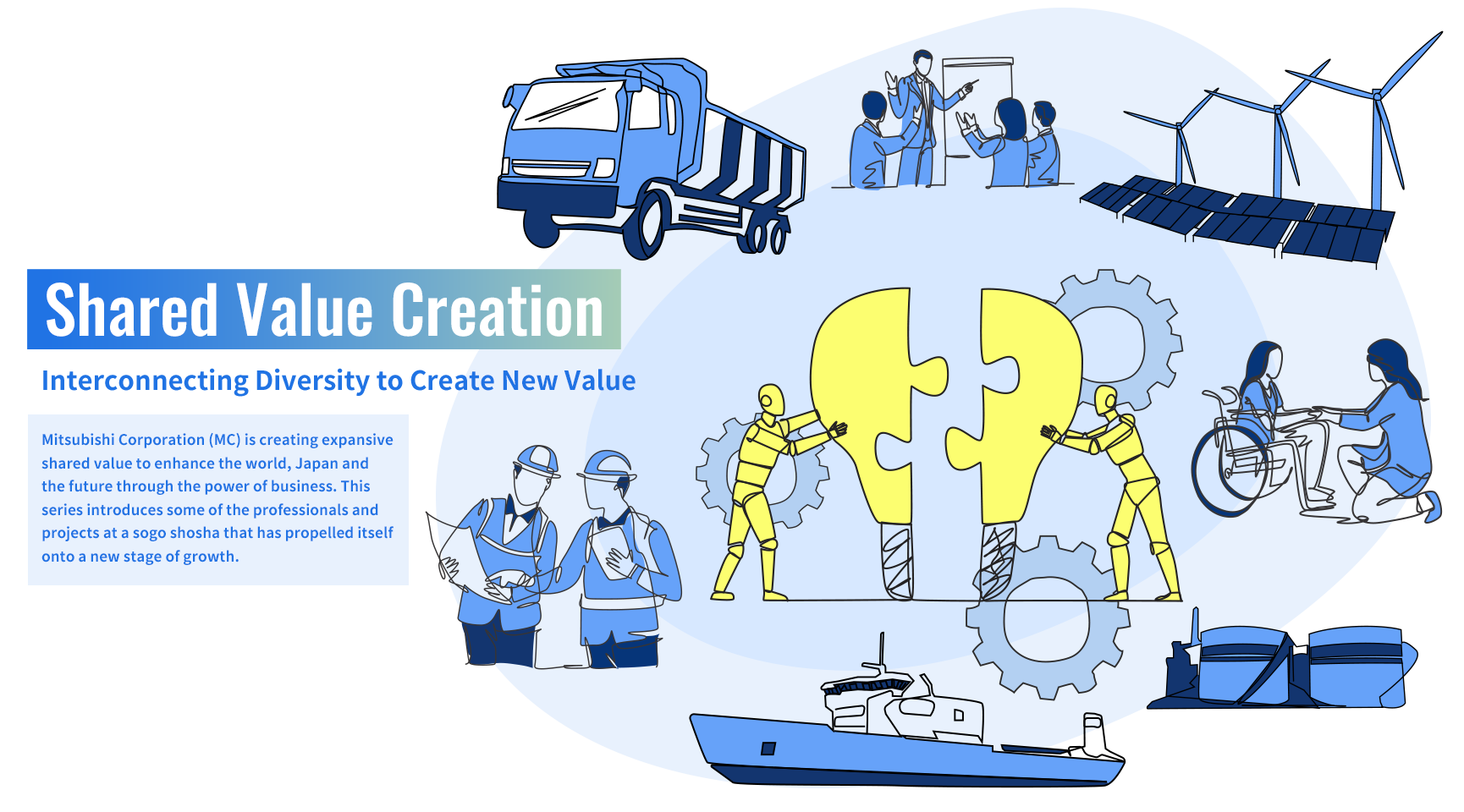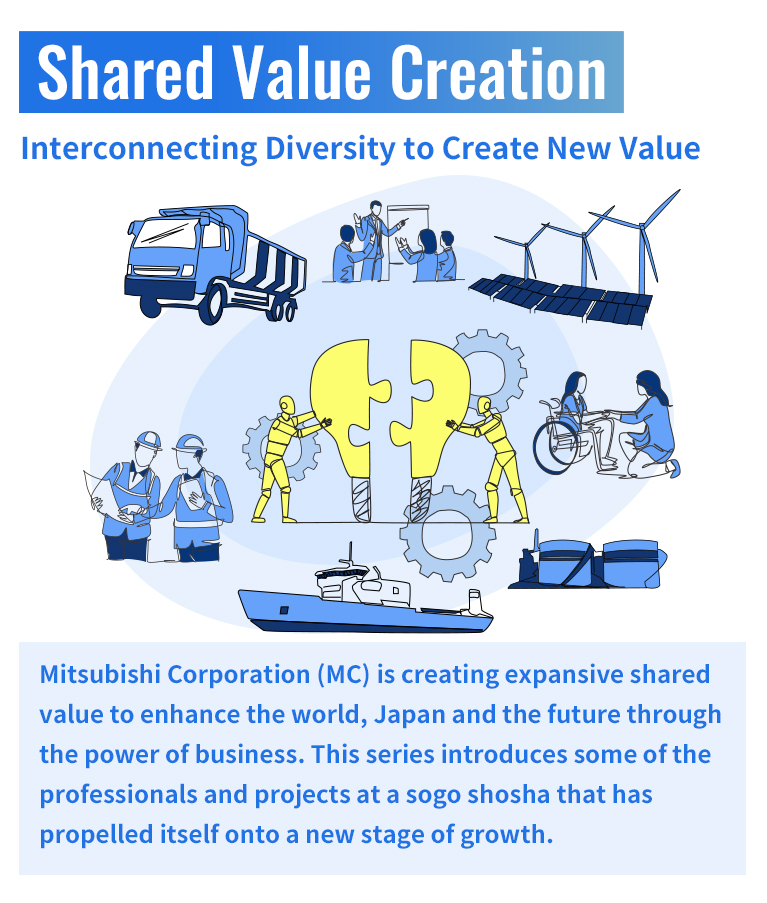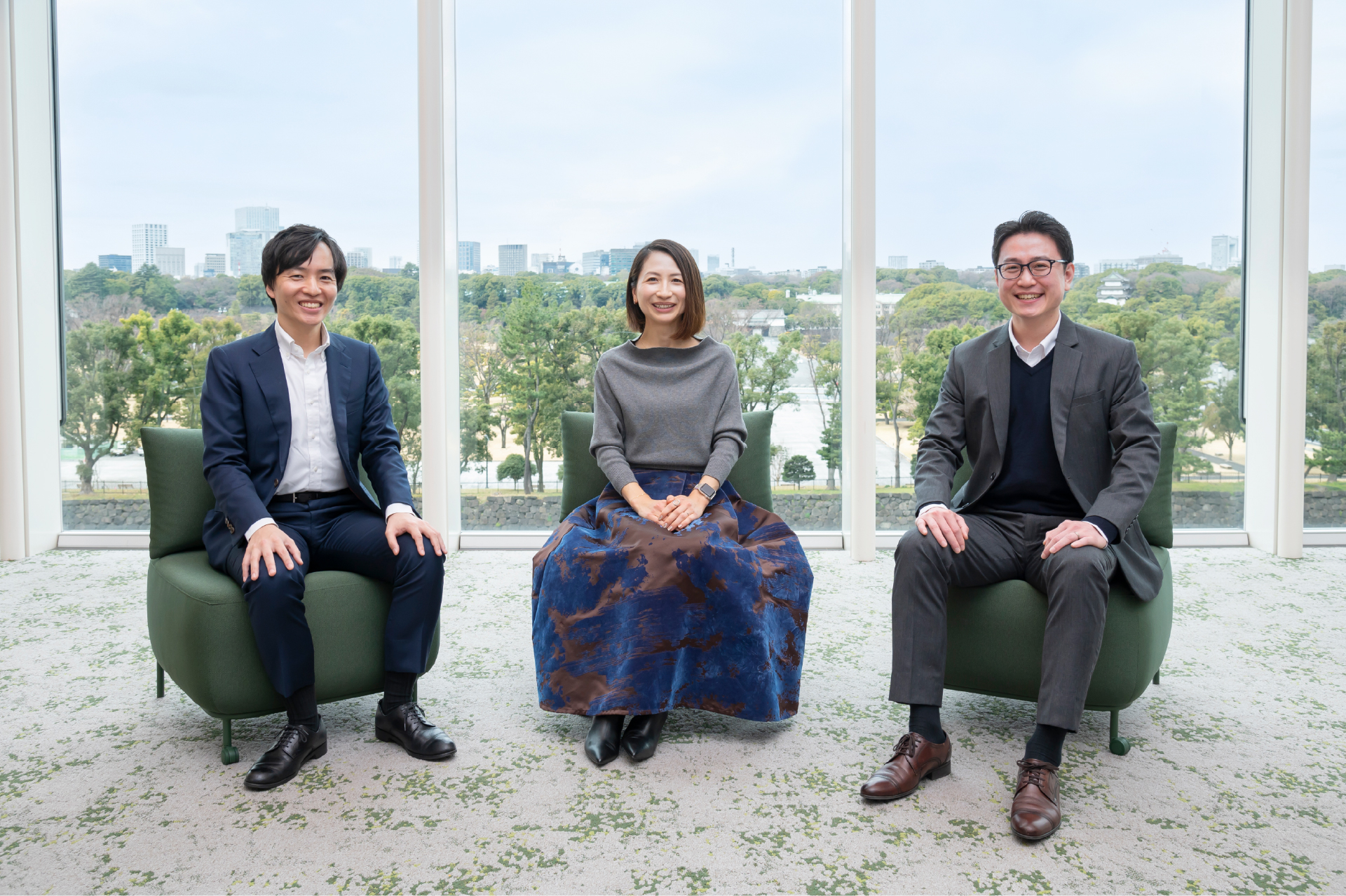Corporate staff at Mitsubishi Corporation play a vital role in supporting the company's global operations across a wide range of functions, including general affairs, legal affairs, and human resources. Reflecting the breadth of the company’s operations, their functions and roles are equally diverse.
In this two-part series, we spotlight three employees from the Global Planning & Coordination Department, IT Services Department, and Business Investment Management Department — three of the 12 departments that make up the corporate team. They respond to a common perception: "Isn’t your work just routine?" But the reality is far more dynamic. What drives their work? How have their careers evolved? And what are their thoughts on mentoring the next generation? Kazuhiro Sekine, Editor-in-Chief of Asahi Shimbun GLOBE+, sat down with them to listen to their stories. Their journeys will be introduced in a two-part series.
-

Chung-kyo Lim
Global Planning & Coordination Dept.
Asia & Oceania Office -

Takahiro Ataku
IT Services Dept.
IT Infrastructure Team -

Misako Hatanaka
Business Investment Management Dept.
Investment Management Team
Senior Manager
*Affiliations are as of the interview in January 2025.
*Titles are omitted in the text.
[Interviewer] Kazuhiro Sekine (Asahi GLOBE + Editor in Chief)
Twelve Specialized Teams Supporting the Company's Operations
—— The roles of Corporate staff may seem familiar, but its full scope and position within the company are not always well understood. To begin, could you explain what Corporate staff do and the role they play within the organization?

Hatanaka Corporate staff play a role in supporting Mitsubishi Corporation's strategic business operations. For example, when a new project is launched by the Sales Group, a wide range of specialized support is required for its execution. This includes identifying potential business opportunities through global intelligence functions, evaluating financing options, analyzing profitability and risk, and performing legal and accounting reviews. Following the investment phase, additional support is necessary to drive value creation within the business. Moreover, it is important to oversee all these functions and support the overall operation of the company. This includes not only the aforementioned functions, but also the development of company-wide human resource strategies, IT-based operational support, and information dissemination to stakeholders, including shareholders. These diverse functions are handled by the 12 departments* of Mitsubishi Corporation's Corporate staff, working together to support the company's operations.
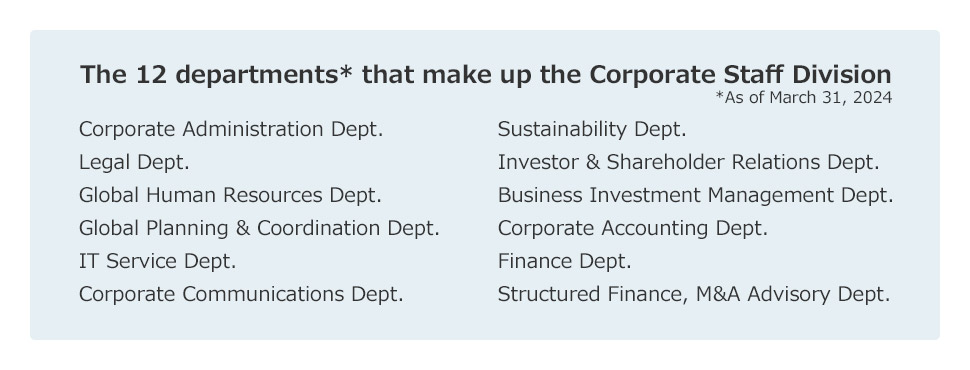
—— You are supporting the development of Mitsubishi Corporation’s wide range of domestic and international businesses.
Hatanaka That's right. Mitsubishi Corporation has eight sales groups that have extensive connections across various industries and develop diverse businesses around the world. Given the varying legal systems, currencies, and business environments across countries and regions—as well as the distinct strategies required by different industries— Corporate staff is required to fulfill a broad and complex set of functions. Our work also involves close communication with the sales team who are at the forefront of the business. By combining the expertise of Corporate staff with the expertise of the sales team, we carefully shape each project and incorporate it into the company's overall operations. That's how I see our work.
As Coordinators of Business, Talent, and Information
—— Please tell us about the work of each department. First, what kind of work does the Global Planning & Coordination Department do, Mr. Lim?

Lim As the name suggests, we plan the strategies of various countries and regions, aligning them with the objectives of the sales groups while coordinating business activities, talent, and information. Specifically, we play the role of a hub for overseas offices, which maintain relationships with various stakeholders such as local business partners and government officials. We address their concerns in a one-stop shop manner and provide support from the Tokyo headquarters. Then, we compile intelligence. In recent years, the domestic and international environment has undergone rapid change. To respond to this in a timely manner, continuous information gathering and analysis are essential. The information spans a wide range of areas, including geopolitics, political and economic situations, policy trends, partner strategies, low-carbon and decarbonization initiatives, as well as advancements in technology and innovation. We must analyze how this information could impact Mitsubishi Corporation's business. We also support business development by proposing business opportunities that may not be easily noticeable. This is done, in cooperation with various countries and regions and presented to both management and sales groups. Additionally, we have a team responsible for insurance, an important function for managing business risks and ensuring stable management. These tasks are divided into teams by region and function, and I mainly serve as the contact point for the Asia and Oceania region.
—— What kind of information does the intelligence include, for example?
Lim One example is that you might come across news about China’s real estate bubble. However, in many cases, there is a lack of in-depth analyses that connects the dots, such as why the real estate market was overheated in the first place, why the previously soaring prices are now falling, and how to interpret policy directions and their future impacts. Moreover, nothing specifically shows how changes in the Chinese real estate market could impact Mitsubishi Corporation's business. Therefore, the Global Planning & Coordination Department collects and analyzes information from public sources, experts, government officials, partners, and offices around the world. We then report to management and related sales groups to support their decision-making. In cases like that, Mitsubishi Corporation's broad industrial contact points and networks are very useful. We believe that the expansion and accumulation of such intelligence will lead to further growth for the entire company.
Supporting Investment Decision-Making:
"Should We Take This Risk?"
—— What kind of work does the Business Investment Management Department do?

Hatanaka The Business Investment Management Department supports management decision-making throughout the business lifecycle in two main ways: risk analysis when making new investments and monitoring and follow-up after the investment is executed. When you hear "risk," it might evoke a feeling of anxiety or something to be avoided. However, by accurately analyzing future uncertainties, taking certain risks can lead to obtaining potentially significant returns. Investment projects that exceed a certain scale require approval by the President's Office or the Board of Directors. Our Business Investment Management Department assesses the nature and extent of potential risks. We evaluate whether these risks can be avoided, transferred, or mitigated, and conduct additional analyses to support informed decision-making. Based on our findings, we compile recommendations to guide management in determining whether the company should proceed with the risk.
—— What’s an example of a point you check in risk analysis?
Hatanaka The first thing we check in a project is the vision and strategy. Clarifying our aim and reason for investing becomes the basis for various subsequent judgments. Then, we evaluate macro-level factors beyond the company’s control, such as industry trends and the economic, political, and cultural characteristics of the country or region. A core part of our evaluation involves examining the business plan, assessing the added value Mitsubishi Corporation can bring, and evaluating the expected profitability. It is also essential to review the terms and conditions related to shareholder rights and obligations. However, it is impossible for the Business Investment Management Department to analyze and evaluate all the risks, so we work closely with the Sales Departments promoting the projects, as well as with other departments such as the Legal, Finance, and Financial Development.
Contributing to Solving Social Issues with the Power of IT
—— Mr. Ataku, please tell us about the work of the IT Services Department
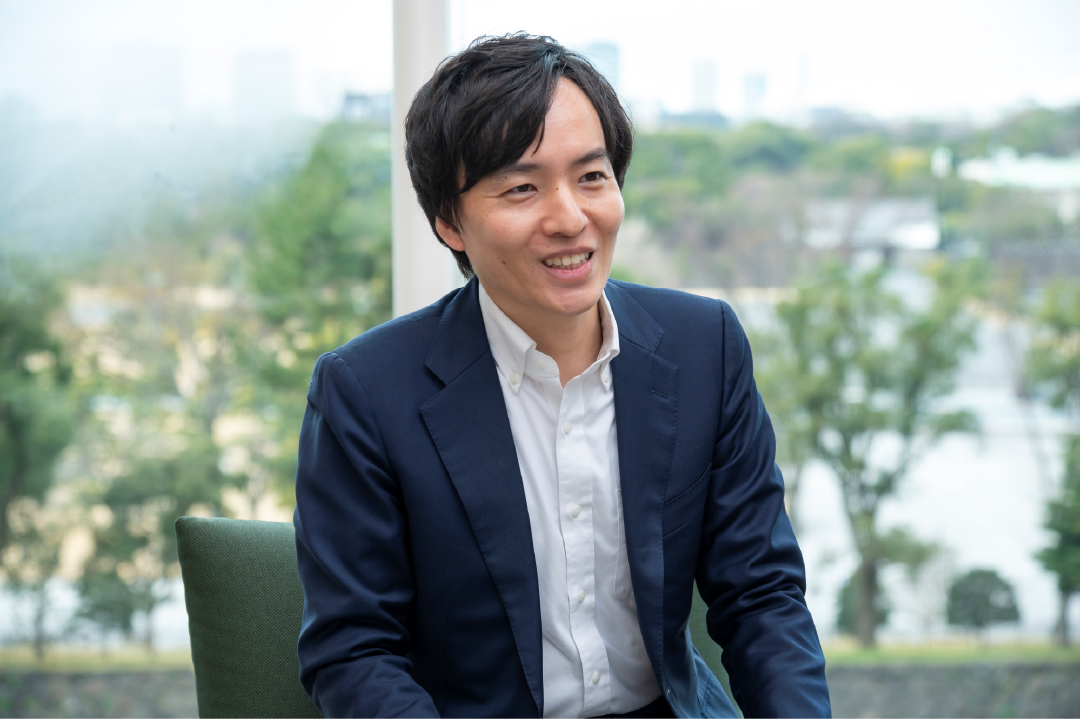
Ataku The IT Services Department is responsible for operating and developing the systems essential to daily corporate operations. Other key roles include strengthening cybersecurity, promoting business process improvements, and supporting business advancement using the latest technologies — all aimed at promoting Mitsubishi Corporation's reform and growth. We also provide some support to group companies and overseas offices. Since joining the company in 2016, I have been involved in strengthening the back office, such as launching an AI-powered help desk and introducing AI translation tools company-wide.
—— After that, you were seconded to Lawson at your own request. What kind of work did you do at there?
Ataku Starting in April 2020, I was involved in various projects at Lawson for about five years. One of the major challenges was the development of the system AI.CO (AI Customized Order/AI Consultant), which recommends product assortment, ordering, and discounting using AI. Multiple headquarters, including the Product, Sales, and IT Solutions Headquarters, collaborated on this project. Ordering products such as rice balls, bread, lunch boxes, and desserts is done by individual Lawson stores based on the weather and past sales performance. Amid the ongoing shortage of part-time workers, this task was a burden to the stores, as was food waste due to unsold items. To address this, we developed this system where AI predicts optimal order quantities based on factors such as inventory levels, past sales data, and weather conditions. The system also calculates and proposes the optimal discount amount, timing, and quantity of unsold items — for example, suggesting, "Discount this number of items at this time for this amount." While the final decision is left to the store, a feature called “Driver” allows store staff to input their preferences into the system. This allows AI.CO to realize the store’s ideal sales strategy and floor layout. AI.CO was introduced to all franchise stores nationwide by July 2024. As a result, in addition to improving the gross profit of the stores by reducing opportunity loss, food loss, and discount loss, we received feedback such as "Thanks to the high accuracy of the orders, food loss has decreased" and "The burden of ordering has decreased, enabling store management to continue with their other responsibilities." I am very pleased that we were able to contribute to solving this social issue through digital transformation. It was also a personally meaningful and rewarding experience.
Embracing the Weight of Responsibility being in
the "Passenger Seat" of Management
—— We will explore your thoughts on your work in more detail in Part Two, but for now, on behalf of everyone, I would like to ask Ms. Hatanaka: “Do you have any mottos that you value in your daily work?
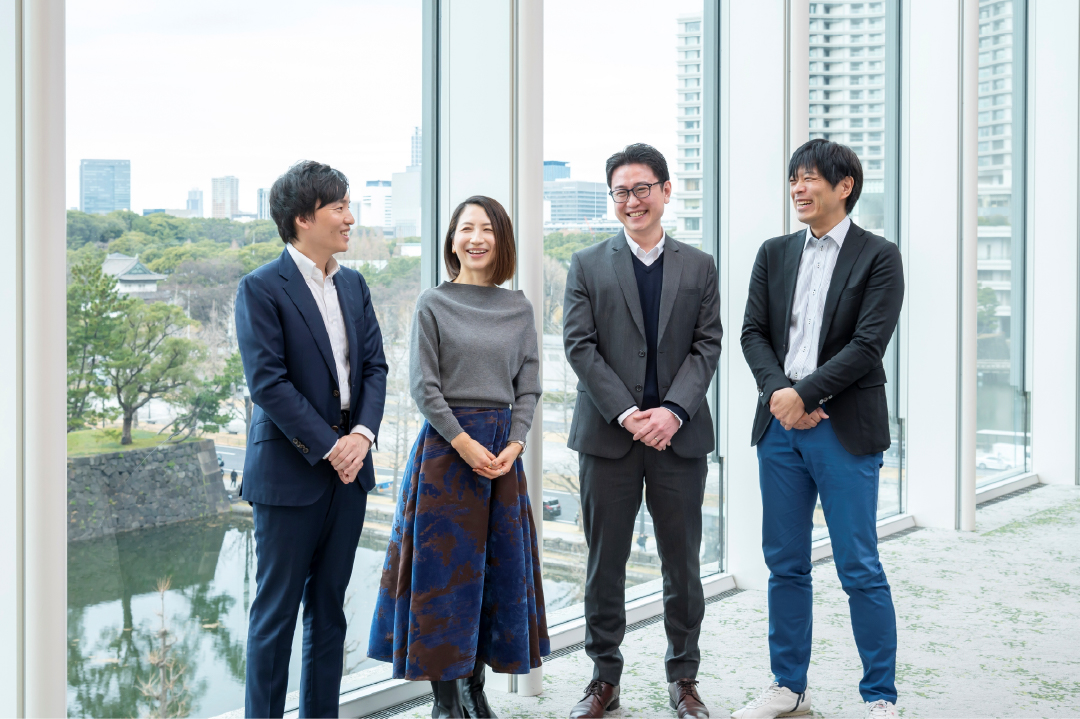
Hatanaka About seven years ago, I was seconded to Diamond Generating Europe (DGE), a London-based company specializing in renewable energy investments, where I served as a risk manager. At that time, the president of DGE told me, "I want you to sit in the passenger seat next to me, instead of telling me something’s dangerous from the safety of the shoulder. Only by being in the same car can I step on the brakes if you tell me it's dangerous. If you really think it's dangerous, you can push me aside and apply the brakes yourself. I think these words perfectly express the weight of responsibility that accompanies a risk management role. Whatever the project, I face it as seriously as I would if it were happening in my car. I always keep that lesson in mind.
—— Even in cases less extreme that ones where you would have to "apply the brakes yourself," there must be many situations where you have had to convey strict opinions during a project evaluation.
Hatanaka That's right. The projects evaluated by the Business Investment Management Department are like raw gems — discovered with a lot of time and effort. This naturally fosters a deep sense of passion and commitment toward each project. However, when it comes to evaluating the inherent risks, we often find ourselves needing to take a calm stance. There are times when differing opinions lead to spirited debates, or when I have to convey an opposing view to someone far more senior than myself... It is a job that requires a lot of courage (laughs). However, my colleagues at Mitsubishi Corporation are all straightforward and passionate. Even if our opinions differ, we share a fundamental desire to make projects successful and do good work. This trust leads to healthy discussions and serves as a strong foundation for performing this role effectively.
—— Listening to everyone's stories changed my preconceived notions about the work of Corporate staff.
Hatanaka Corporate staff is often thought to be engaged in routine and static work with predetermined content and methods, but I think our work is a bit different. In recent years, Mitsubishi Corporation has been shifting to "business management," where we enter the business, create value proactively, and grow. We are also promoting a "cyclical growth model" where we replace management resources with the next growth drivers and growth pillars in response to changes in the business environment. Therefore, the Corporate staff who support this are required to constantly be up to date on new information and ready to face new challenges. It is a stimulating and rewarding environment.
- Our next article will feature the second half of the roundtable discussion with members of MC's Corporate Staff Division.
